Some time last week, Dr Ibu Faith shared her recent achievements on LinkedIn which received a lot of accolades. Being a source of inspiration to us all and people on the path of career advancement overseas, the Medical Mirror team decided to meet up with her for an insight into her unabridged story. Graduating as the best student in her medical school set and having above the 97th percentile in her USMLE scores (with other land slide achievements), in this interview, she shared the “behind the stage” activities of the openly celebrated success and gave pointers for navigating and moving ahead in the USMLE Journey for potential candidates.
Below are excerpts from the interview by the Medical Mirror correspondent.
Q1: Some of us know you but could you please introduce yourself, for the benefit of those that don’t?
My name is Faith Ibu, born and raised in Lagos, however from Benue state and the first of 5 children. I graduated from the College of Medicine, UNILAG in 2018, and subsequently did my medical internship at Benue State Teaching Hospital.
Q2: That was quite a precise introduction. How would you describe yourself, what type of person would you say you are?
I would describe myself as a passionate and highly motivated person that believes in giving my best to all that I do and going all in for my causes to be achieved. I also like to work with people, because I believe “when people work together they bring out the best in each other”. I love God and I am crazy about my family and friends.
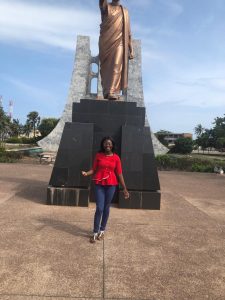
Q3: Congrats on your new feat, So how did you know this was what you wanted and when did you start working towards it?
Going to medical school – long before graduating, I always knew I wanted to go to the United States (US) to further my studies and medical education because it seemed to be the place where all the medical advances were coming from and I wanted to be a part of that. During that period, while surfing the internet, I came across resources and materials for the US licensing exams and I was impressed by the detail, teaching methods and overall quality of education that was provided. It was so fascinating that I started going through the materials and books then. I also interacted with respected senior colleagues who were working on the pathway to the US and they provided me with more information, nudging me towards this path. However, the definite decision to write the USMLE (United States Medical Licensing Examination) came after graduation – during my Housemanship days.
Q4: So what started this “journey to greatness” for you?
There was always different options for career advancement available to medical doctors, there was Primaries for residency in Nigeria, PLAB to practice in the UK, USMLE to practice or train in the US amongst others. I made a decision to pursue the US route based on my short and long term goals for medical practice, although the constraint of resources and cost were always a concern. I decided that I didn’t want to be held back for lack of trying and resolved that failure was more acceptable to me than regret. Making that decision, I would say, started the journey. I started studying during Housejob (HJ) which was so busy that what I could achieve was minimal but I ensured I kept trying regardless. However, my major preparation for the exams started at the end of HJ when I decided I was going to postpone NYSC, and take some dedicated time off to stay home and intensify my studies for the exam.
Q5: Can you give us an insight into the “behind the curtain” of the highly celebrated success we see today – the hard work, the challenges, the ugly moments, the lessons and support you got?
The process was challenging, yet exciting. I would say the initial rate limiting step for me was actually deciding to write the exam. Once I did, I surprised myself by studying up to 10 hours a day on many days and learning large amounts of material. My plan was to take 5 months solely to study and get prepared for the exam but the pandemic came and I was stuck home for up to 10 months. I was 2 months away from my exam date when we plunged into the peak of the COVID-19 and the lockdown started. This period was laden with a lot of uncertainties and fears. Travel in and out of the country was banned at that time and the closest exam venue is in Ghana.
There was a lot of uncertainty with when the lockdown would be over, when and where I would have to go to take the exams, if I’ll be able to take the exam, progress or integrate back to work. Fully conscious that I gave up NYSC, working full-time; I didn’t know what was going to happen or when it was going to happen and I began to fear I had made the wrong decision. At some point, I had to go back to work to support my family because I was the only one able to work during the pandemic and earn money to meet our needs. It became a struggle to combine and balance part-time work, study and family responsibilities amidst the anxiety at the time. I also knew that good scores weren’t all I needed to make it all the way through so I needed a rounded CV showing participation, leadership and commitment to my chosen specialty, so I started volunteering. I also became a founding executive of Emergency Medicine Interest Group (EMIG) Nigeria, started research projects and online courses. I had to learn to plan, prioritize and handle several projects productively and excellently at once which I would say has made me a more effective person.
During this trying, difficult and busy 18-month period (to prepare and write both steps of my exams) which increased my capacity and beyond, I must say, the support of family and friends was invaluable. My family understood and supported the need for me to stay home and study because naturally, after studying for about 6 years you are expected to start contributing to the family… so I must give them a credit… I also had instrumental friends – the ones who had taken the exams before me that I could call for moral support, the ones I could call and cry to at any time of the day – friends who believed in me and kept rooting for my success. I learned, in a very real way, what friendship means and the importance of having people that support you and encourage you when it gets difficult, which will certainly happen.
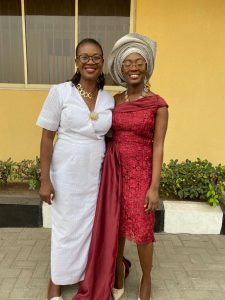
Advice to people – Try not to do it alone, get people going the same direction with you to move with, so they pull you up because it can get very tiring and discouraging along the road to achieve your goals.
Q6: You mentioned using up 18 months to prepare and write both steps of the USMLE exams, Can you further breakdown the timing?
I finished HJ early December 2019. For the step 1, I had done some reading during Housejob but major reading after took up to 8-10mons (instead of the planned 5-6mons). Travel eventually opened up and I went for my step 1 exam in Sept 2020 in Ghana (which was initially supposed to be in April/May 2020), all thanks to COVID-19. After step 1, I took up a project in December 2020 in Enugu where I teach and mentor other doctors who want to take the USMLE. I went for NYSC in Jan 2021 and have used the last 5 – 6 month to read and prepare for step 2 which I wrote in May 2021, also in Ghana.
Q7: Talking about the project in Enugu, can you shed more light on that?
The name of the project is Foundation Educational Support Program (only in Enugu at the moment). It was set up with the support of a doctor in the US to help others writing the USMLE by providing materials for studying, guidance and mentorship for the process. I work with them as an Educational Advisor; I create study plans, hold discussions, do regular assessments and evaluation in preparation for exams.
Q8: So how was it like preparing for step 2, was it the same with step 1 in light of the era we are in and the initial uncertainty?
My experience in preparing for step 2 was a bit different than I had imagined it would be; unique from my experience while preparing for step 1. My step 1 score was above the 97th percentile, and in my desire to always strive for the best possible; I was under pressure to do even better and always that fear of “can I do it again?”, “can I do it as well?”, “what if I fail?”… There was also this general idea that step 2 was easier which now I do not necessarily agree with, as my expectations were met with a different reality. The dynamics and format of the exam is now different and was recently changed, making it a tougher exam than it usually was.
I initially thought I would be able to take the exam in 3 months but at the end of that time, I knew I wasn’t ready. By now, I had been studying for over a year and I just wanted it to be over. I experienced burnout severally and had to learn to pace myself. I cut down on my study hours (6 – 8 hours per day as compared to the 10 hours for step 1) to rest and work on other projects – This was when my personal time management skill showed up. I had to be patient with myself, really patient with the process and just keep pushing. While there are many stories of people who achieve similar feats in less time, this period taught me to really see my own journey as unique and work with my own abilities to get where I wanted. Setting high standards is good but we also need to learn to cut ourselves some slack, breathe and relax occasionally. I told myself I would do it when I could go into the exam knowing that I did all I could. I’m glad I did.
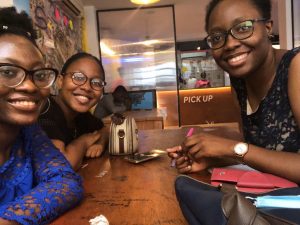
I realized that we set too many high standard for ourselves and Preparing for step 2 taught me to lower my expectations from myself – and I do not mean totally bring it down to a mediocre level. Just a little lower to allow yourself rejuvenate and continue the struggle.
Q9: What were the financial implications for the exams and how you were able to manage through the journey in 16 to 18 months despite the COVID-19 times we find ourselves?
The time cost of the exam and finances attached are valid reasons why people do not pull through the USMLE journey. Last year, the exam itself cost about 1200USD. However, about 2000USD is being spent on step 1 alone due to added cost for travel to and fro Ghana, for accommodation, 3 COVID-19 tests and other minor expenses. Even for step 2, I had to do up to 4 COVID-19 tests. For me, I had always known what I wanted and knew it was expensive so I saved a huge percent (~70%) of my HJ salary and invested too, so that covered the exam costs and some associated expenses. Also, I had to solicit some support for the extra costs, with family and friends helping out. With the falling value of the naira, it has become even more difficult to fund the process.
Q10: Asides the money, what other cost do potential USMLE candidates count, what other factors should they put in perspective?
I must say that the USMLE is one of the toughest and most competitive licensing examinations in the medical profession, so asides the cost – which is a rate limiting barriers for this career pathway – the academic aspect is also a huge part. Hence, combining and balancing these two aspects well is where most doctors have major problems. Again, for me, I had my mind made up that no matter the cost or what happened, this was what I wanted and would do. Even if I did both steps and couldn’t continue due to cost implications, I would take a pause, go the PLAB route, get the funds needed and return to complete the journey. But I wanted and ensured to get the hardest part of the journey (which were the exams) out of the way, knowing fully well that between HJ and NYSC was the only window period I would get to dedicate to reading alone for the exam.
As an IMG (International Medical Graduate) looking to get into the US residency training program (with a set quota), having high scores was going to be a huge advantage, so I made up my mind to do what was necessary to get those scores by putting in a lot of time and resources. Really, there is a lot of time cost and opportunity cost involved in the process. Albeit, everybody’s journey can be unique and based on several factors such as year of graduation, specialty choice, US clinical experience and others. Therefore, it is important to get some help, seek counsel and advice on your specific situation from people with experience.
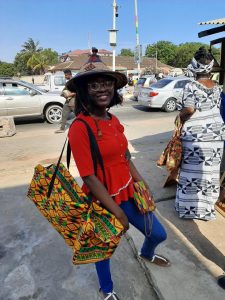
Q11: Knowing your enthusiasm about Emergency Medicine (EM), what are your Views about EM in the Nigerian healthcare setting?
Emergency Health care in Nigeria needs attention – from healthcare providers, policy makers, investors… attention from everybody. Millions of preventable deaths occur each year due to inadequate emergency healthcare. Our emergency systems are fraught with challenges such as a lack of pre-hospital emergency care, barriers to obtaining emergency care even in our tertiary facilities, little dedicated training of healthcare workers in EM and even at the community level, failure to recognize emergencies and a lack of knowledge on the right steps to take in an emergency. Personally, I have lost people due to these challenges and I think its high time we all started paying attention and taking steps.
Emergency care is advancing and progressing around the world, and I have hope that once health workers, policy makers, investors and the populace start moving in that direction; to put structures in place and work on the system, we can and would have a system that meets the needs of our population. Being a part of EMIG Nigeria, I see dozens of medics with a developing interest and passion for developing EM in Nigeria and beyond. This gives me hope, because networks are being built across board and in the next few years, we should see changes. Also, after my training, I do hope to come back to Nigeria to contribute to emergency care development.
Some of the ways to improve emergency care in Nigeria would include; educating the populace on first aid emergency care, providing and equipping emergency medicine department in facilities, training personnel for pre-hospital and intra-hospital emergency care, providing functional and equipped ambulances with trained medics on them and so on…
Q12: From here what next?
To get my certification to apply for residency slots in the US. USMLE is just the licensing exam, to get certified, I need to get a passing score on OET also. After then I’m qualified to apply for residency in the US. There is only one cycle of residency applications per year in the US, so the plan is to be ready by then and apply.
Q13: Any final notes for young doctors struggling, trying to find a pathway or wanting to go this same route?
You need to know that “Every body’s journey is different”. It’s important to decide what your most important goals are, find out what it takes to get to that place and commit to achieving those goals – not thinking its unrealistic. A friend of mine uses a phrase that I like so much, ‘dogged but flexible’ which is what we need to be to push to our goals.
Figure out what you want first, figure out what needs to be done next, then make plans towards getting it done and do it!
Also, it always helps to show commitment in your intended area of specialization. It helps to pursue a balanced experience in academics, clinical practice, volunteering, leadership and research. Likewise, learn to network and build meaningful relationships. We generally have a culture of looking down on the things we’ve done, what we’ve achieved and playing down our talents and skills but this can be counterproductive in a world that is increasingly vocal. Put your best foot forward, be truthful and tell a powerful story.
It is an advantage to put yourselves out there – present yourselves well and blow your own trumpet.
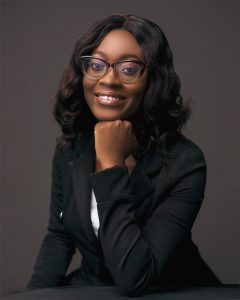

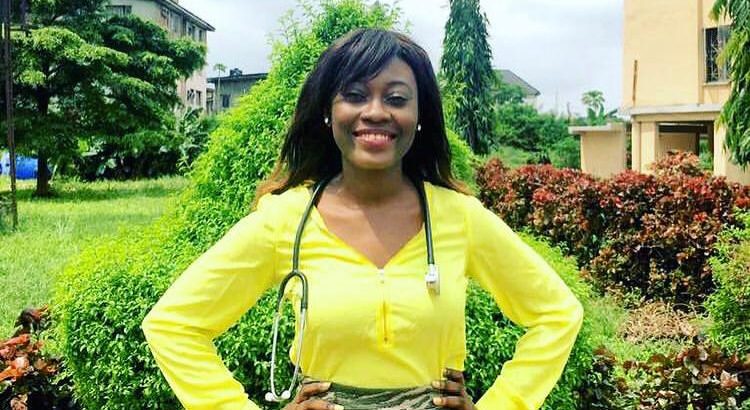
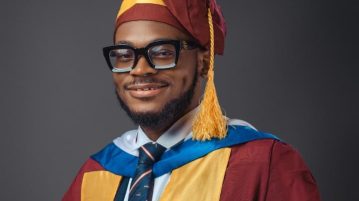
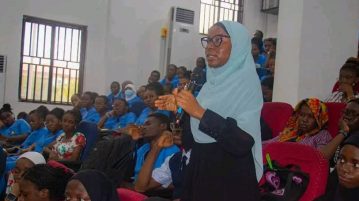

Discussion2 Comments
This was very insightful. Thank you Dr. Ibu and welldone.
Inspiring!